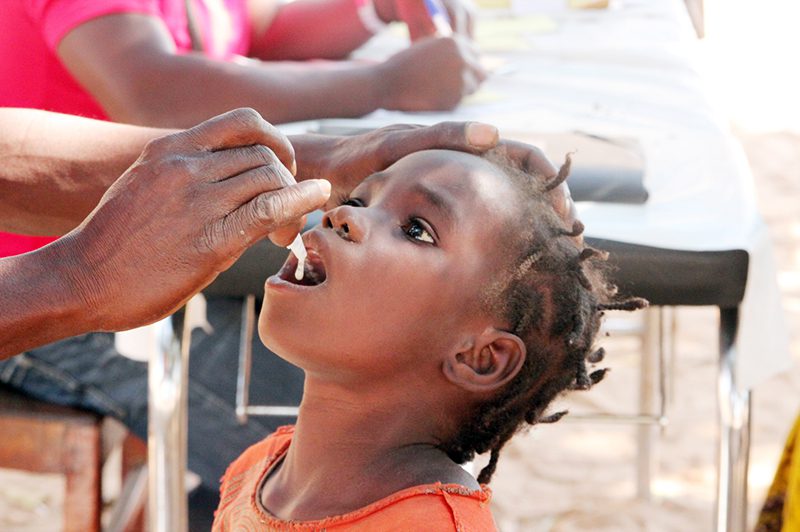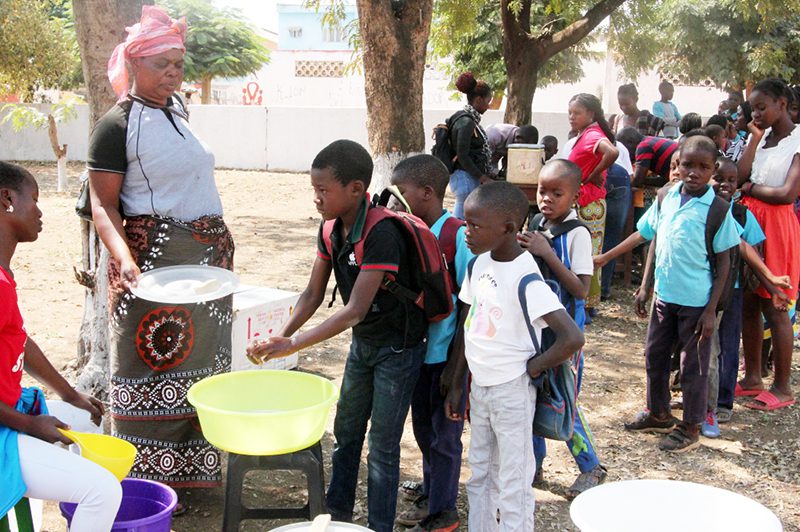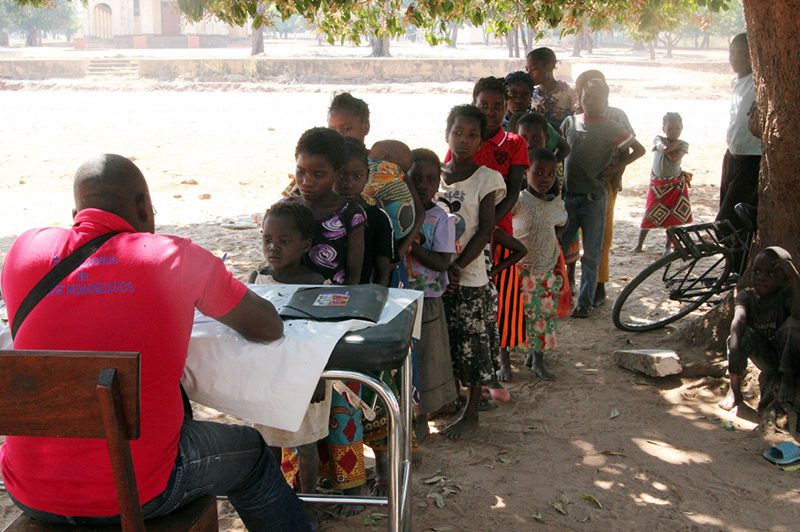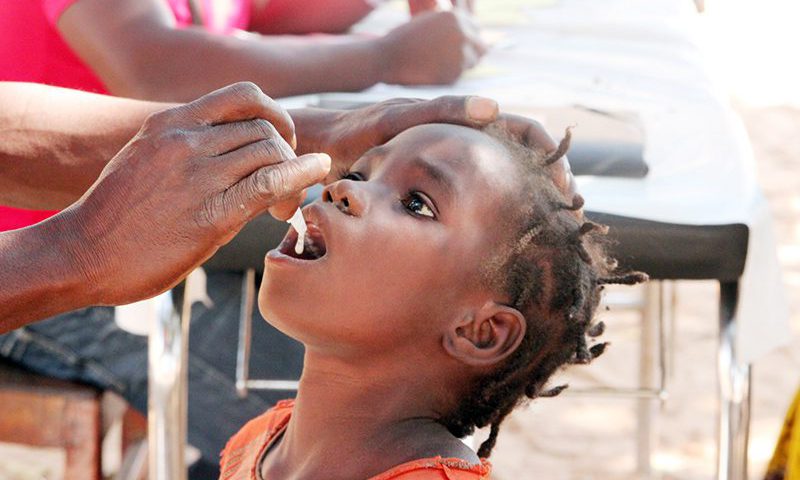– Joint initiative aims to prevent and control cholera, and secure sustainable cholera and diarrheal disease surveillance
– WASH campaign to promote access to clean water and behavioral change for appropriate sanitation and hygiene practice
– “KOICA is joining the program to contribute to ‘Ending Cholera—A Global Roadmap to 2030’”

The Korea International Cooperation Agency (KOICA), in collaboration with the International Vaccine Institute (IVI) and the Government of Mozambique, is conducting a mass vaccination campaign for approximately 190,000 people at risk of cholera in Mozambique in August 2018.
The cholera vaccination campaign is being conducted in the Cuamba District, located in the Niassa Province in the northern part of the country adjacent to the Malawi border, as part of the Mozambique Cholera Prevention and Surveillance in Africa (MOCA) project. MOCA is aimed at preventing and controlling cholera outbreaks through vaccination and strengthening of cholera and other diarrheal disease surveillance activities on the ground. The project is supported by South Korea’s Global Disease Eradication Fund, which is raised by levying 1,000 won on each international air traveler, and managed by KOICA.
“In Mozambique, particularly in Niassa Province, there is a prevailing situation of poor sanitation as well as non-observance of basic measures towards disease prevention, mostly infectious diseases. This in turn generates conditions for outbreaks of diarrheal diseases, including cholera,” said Dr. José Alberto Manuel, Director of The Niassa Provincial Health Department, DPS Niassa. “The administration of oral cholera vaccine to the population of Cuamba will reduce the risk of cholera outbreak in the future and will complement the efforts aimed at cholera elimination through health promotion, already witnessed in the last three years.”
The first round of the mass cholera vaccination campaign was conducted from August 7 – 10, 2018, and is being followed by the second round from August 27-31. Approximately 198,000 individuals (ages one year and above) living in cholera-endemic at-risk communities in the Cuamba District are targeted for immunization. The campaign is using Euvichol-Plus®an oral cholera vaccine that was originally developed via a technology transfer from IVI. Euvichol-Plus®, manufactured by South Korea-based EuBiologics, has been prequalified by the World Health Organization for global use, and has been demonstrated to be safe and effective for cholera prevention and control in a number of countries worldwide. OCV is one of the key tools of ‘Ending Cholera—A Global Roadmap to 2030,’ an ambitious strategy that was launched by the WHO in 2017, aimed at reducing cholera deaths by 90 percent by 2030.

“On behalf of the people of the Republic of Korea, KOICA is pleased to join IVI and other partners in supporting the MOCA project, including a mass OCV vaccination campaign, in Mozambique,” said Mr. Kong Moo Heon, KOICA’s Country Director for Mozambique. “KOICA is joining the program to contribute to “Ending Cholera — A Global Roadmap to 2030” in order to protect the most vulnerable people from cholera.”
The WHO recommends the use of OCV in combination with surveillance, water, sanitation and hygiene (WASH), social mobilization, and treatment to prevent and control the disease. Following the OCV campaign, surveillance for cholera and other diarrheal diseases will be performed to determine the impact of the vaccination. Community engagement for WASH behavioral change to educate people to practice appropriate sanitation and hygiene will continue during and after the vaccination campaign, and will be led by WaterAid, in partnership with the INS, MoH and IVI.
The project also involves the installation of a new laboratory for diagnosis of diarrheal diseases in Cuamba as one of the efforts to strengthen local capacity for disease surveillance, prevention and control. “Capacity-building activities through MOCA will empower the local public health infrastructure, particularly the cholera and diarrheal disease surveillance system including laboratory diagnosis,” said Dr. Ilesh Jani, Director of the INS. “Indirectly, the MOCA project is expected to further benefit the entire people of Mozambique through the preemptive cholera vaccination campaign, surveillance, WASH and other activities, as they will help prevent future cholera infections and outbreaks of other diseases.”
All data generated through MOCA activities will be analyzed and disseminated to inform local and national health authorities in Mozambique, as well as international public health and vaccine communities and the general public. This includes research on cholera vaccination coverage, burden of disease, health-seeking behavior of the target population, and cost of illness associated with cholera. “These data will be valuable resources for prevention and control of future outbreaks in Mozambique and other countries in Africa,” said Dr. Florian Marks, head of IVI’s Epidemiology Unit. “MOCA provides a platform to facilitate intra-African public health research collaboration.”
IVI Director General Dr. Jerome Kim added, “IVI is very pleased to work with Mozambique’s Ministry of Health and the INS, as well as KOICA and other partners in the fight against cholera and other diarrheal diseases. Our collaboration through MOCA will serve as a model of collaboration in our concerted efforts to eradicate infectious diseases, and IVI is grateful to partners for their commitment to our successful partnership.”
INS Director General Dr. Jani concluded, “This intervention will bring a comprehensive understanding of new strategies for fighting diarrheal diseases in general and cholera in particular, as the National Institute of Health, in collaboration with IVI, reinforces the commitment of the Mozambican government’s effort to prevent, control and eradicate infectious diseases.”

About cholera
Cholera is an acute watery diarrheal disease that can be potentially life-threatening. The disease is caused by ingesting food or water contaminated with the bacterium Vibrio cholerae, and often strikes vulnerable populations in humanitarian crises or countries with poor water, sanitation and hygiene. Approximately 1.3 million to 4 million cholera cases and 21,000 – 143,000 deaths are estimated to occur every year around the world. Cholera remains endemic in over 40 countries worldwide. The disease is treatable but can kill the patient within hours if left untreated. Currently, there are three WHO-prequalified oral cholera vaccines: Dukoral®, Shanchol™, and Euvichol® (including Euvichol-Plus®), with the latter two developed via technology transfer from IVI. Each of these vaccines requires two doses for full protection. The WHO recommends a combination of surveillance, water, sanitation and hygiene, social mobilization, treatment, and vaccination to prevent and control cholera.
About Instituto Nacional de Saúde (INS)
The National Institute of Health of Mozambique (INS) is an institution of the Ministry of Health. Established in 1991, it is dedicated to the generation of technical and scientific information in the area of Health in Mozambique, so that decisions in the Mozambican Health Sector are increasingly based on evidence. The mission of INS is to participate in improving the well-being of the Mozambican population through the generation and promotion of the incorporation of scientific and technological solutions to the main health conditions and problems in Mozambique. INS’s main functions include: Research, Health Observation, Laboratory Network and Reference Services, and Communication for Health Surveillance. For more information, visit http://www.ins.gov.mz
About Korea International Cooperation Agency (KOICA)
The Korea International Cooperation Agency (KOICA) was established as a government agency in April 1991 and is dedicated to providing grant aid programs of the Government of the Republic of Korea. KOICA endeavors to combat poverty and support the sustainable socioeconomic growth of partner countries. The MOCA project has been funded by KOICA’s Global Disease Eradicating Fund (GDEF), aimed at supporting projects to fight diseases in developing countries; with particular focus on infectious diseases and maternal and child health. For more information, visit http://www.koica.go.kr
About International Vaccine Institute (IVI)
The International Vaccine Institute (IVI) is the world’s only international organization devoted exclusively to developing and introducing new and improved vaccines to protect people, especially children, in developing countries. Established in 1997 as an initiative of the United Nations Development Programme, IVI operates as an independent international organization under a treaty signed by 35 countries and the World Health Organization. The Institute conducts research in nearly 30 countries throughout Asia, Africa, and Latin America on vaccines against enteric and diarrheal infections such as cholera and typhoid, Japanese encephalitis, MERS-CoV, and dengue fever; and develops new and improved vaccines at its headquarters in Seoul, Republic of Korea. For more information, visit https://www.ivi.int






